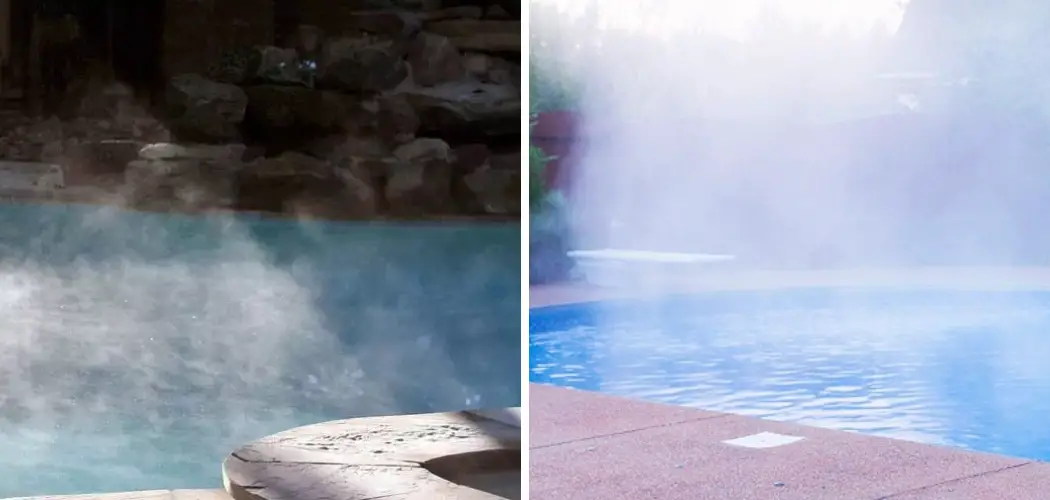Are you tired of constantly refilling your pool because the water keeps evaporating? Don’t worry, you’re not alone. Many pool owners face this issue and wonder how to keep their pool water levels consistent.
Swimming in a warm pool during the summer months can be one of life’s greatest pleasures.
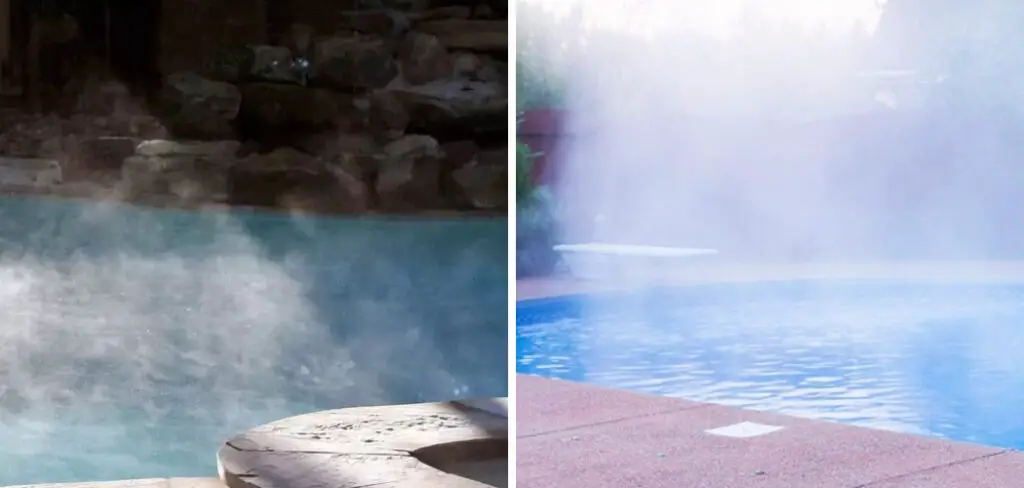
However, if you are like most people with a swimming pool, you know that there is an ongoing battle to prevent the water from evaporating too quickly. If your pool loses more than just a few inches of water each week, it may become necessary for you to take steps to keep that precious resource intact and ready for use.
In this blog post, I will share some helpful tips on how to keep water from evaporating in pool – so grab your towel and get ready!
Why Does Water Evaporate From Pools?
To understand how to prevent water from evaporating in your pool, we must first understand why it happens. Water evaporation occurs due to a combination of factors, such as heat, wind, and humidity levels.
During the summer, the temperature rises, causing the water in your pool to heat up. As a result, molecules within the water gain energy and start to break apart, turning into water vapor. The wind and low humidity levels also play a significant role in the evaporation rate. When there is less moisture in the air, it creates a dry environment, causing more rapid evaporation.
Overall, these factors work together to deplete the water level in your pool, leaving you with a never-ending cycle of refilling.
What Will You Need?
Before we dive into the methods of preventing water evaporation, there are a few items you will need to have on hand:
- Pool cover
- Liquid solar cover
- Windbreakers or barriers
- Shade sails or umbrellas
Now that you have all the necessary tools, let’s discuss some practical ways to keep your pool water from evaporating.
10 Easy Steps on How to Keep Water From Evaporating in Pool
Step 1. Invest in a Pool Cover
One of the simplest ways to prevent water from evaporating in your pool is by investing in a good quality pool cover. Not only does it keep debris out of the water, but it also acts as a barrier to slow down evaporation. If you don’t have a pool cover, consider purchasing one – it will make a significant difference.
Step 2. Use Liquid Solar Cover
Liquid solar covers are an excellent alternative to traditional pool covers. It is a safe and chemical-free option that forms a thin layer on top of the water to reduce evaporation. This product is available in most pool supply stores and is easy to use – simply pour it into your pool.
Step 3. Install Windbreakers or Barriers
As mentioned earlier, wind plays a significant role in accelerating the evaporation of your pool water. Therefore, installing windbreakers or barriers around your pool effectively minimizes the rate of evaporation. These barriers range from strategically planted trees and shrubs to fences or privacy screens. Not only will they reduce the impact of wind on your pool water, but they also add privacy and aesthetic appeal to your pool area.
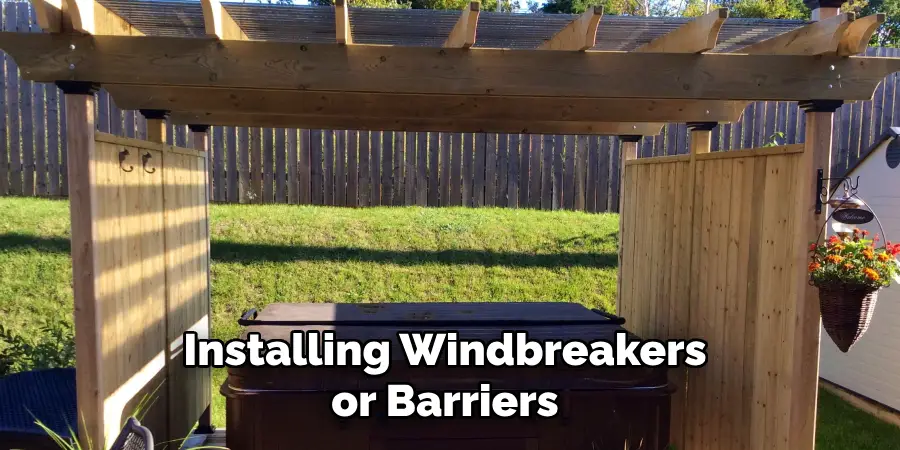
Step 4. Use Shade Sails or Umbrellas
In addition to windbreakers, shade sails or umbrellas can also help reduce water evaporation. When you provide shade over the pool, it significantly lowers the pool’s temperature, thereby reducing the evaporation rate. Shade sails and umbrellas not only protect the pool water but also provide sun protection for swimmers during hot summer days. Select a style and size that works well for your outdoor space, and enjoy a more excellent pool with less water loss.
Step 5. Maintain Optimal Chemical Balance
Preserving the correct chemical balance in your pool is not only crucial for the health and safety of swimmers but also plays a role in reducing water evaporation. Improperly balanced pool water can lead to faster evaporation rates. Regularly test the water and adjust the chemicals as needed, according to the manufacturer’s instructions or a professional’s advice.
Step 6. Limit Pool Heater Usage
Often, pool owners use heaters to make swimming more comfortable, especially during colder months. However, higher water temperatures can lead to increased evaporation. To keep water from evaporating in your pool, consider limiting the usage of your pool heater or adjusting it to a lower temperature. Remember, the cooler your pool water is, the slower the evaporation rate.
Step 7. Utilize a Pool Enclosure
A pool enclosure is an efficient solution for maintaining water levels in your pool. By covering the pool completely, these structures create a controlled environment that reduces the impact of external factors like wind, heat, and low humidity. Enclosures can be a considerable investment, but they pay off in terms of saving water, energy, and even cleaning time. Plus, they extend the swimming season by providing a sheltered and heated swimming environment.
Step 8. Implement Regular Pool Maintenance
Regular maintenance is vital to keeping your pool in top shape and preventing water loss. This includes checking for leaks, as even a small leak can lead to significant water loss over time. If you notice that your pool’s water level is dropping faster than usual, this could be a sign of a leak, and you should seek professional help to address it.
Step 9. Consider a Pool Humidifier
For indoor pools, a pool humidifier can be an effective way to reduce evaporation. These devices increase the humidity level of the indoor environment, thereby slowing down the evaporation rate. Before investing in a humidifier, make sure to consult a pool professional to choose the right model for your pool size and type.
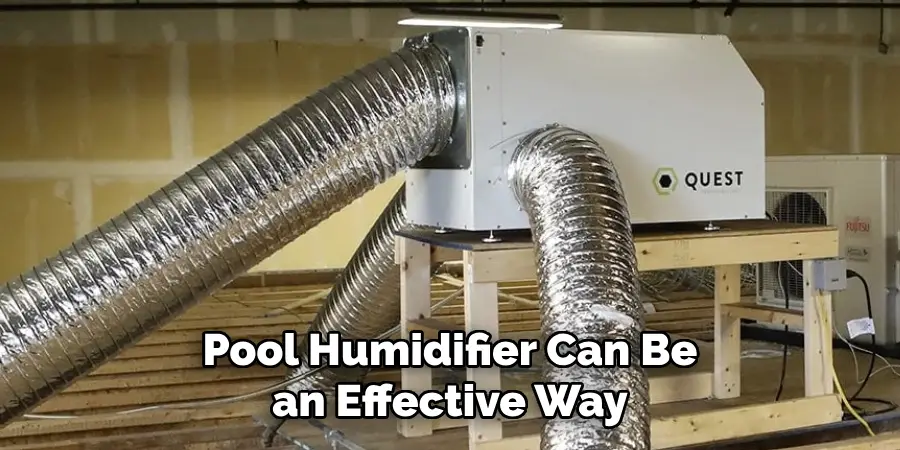
Step 10. Educate and Involve Everyone
Finally, make sure everyone who uses the pool understands the importance of conserving water. Simple actions like replacing the pool cover after swimming, turning off the pool heater when not in use, or notifying you of any potential leaks can make a significant difference in keeping water from evaporating in your pool. Working together, we can all contribute to water conservation.
By following these steps and incorporating them into your pool maintenance routine, you can effectively reduce the rate of water evaporation in your pool. Not only will this save you time, money, and effort in constantly refilling your pool, but it also helps conserve one of our most precious resources – water.
5 Additional Tips and Tricks
- Use a Dark-Colored Pool Cover: A straightforward way to minimize water evaporation is by using a pool cover. By using a dark-colored pool cover, more sunlight is absorbed, and less water will evaporate.
- Reduce Water Temperature: Warmer water evaporates faster than cooler water. So, cutting down on pool heater use can significantly minimize evaporation.
- Control the Pool’s Chemical Balance: Maintaining the proper chemical balance in your pool is crucial. If your pool’s chemical balance is off, it can escalate evaporation.
- Check for Leaks: A leaking pool can result in significant water loss and increase evaporation rates. Regularly check for leaks and repair them promptly to prevent water from evaporating unnecessarily.
- Use Quality Pool Covers: Investing in a high-quality pool cover can help reduce evaporation by up to 90%. A pool cover acts as a barrier, preventing water from coming into direct contact with the air and reducing heat loss. Additionally, it can also prevent debris from entering your pool, keeping it cleaner and reducing the need for frequent refilling.
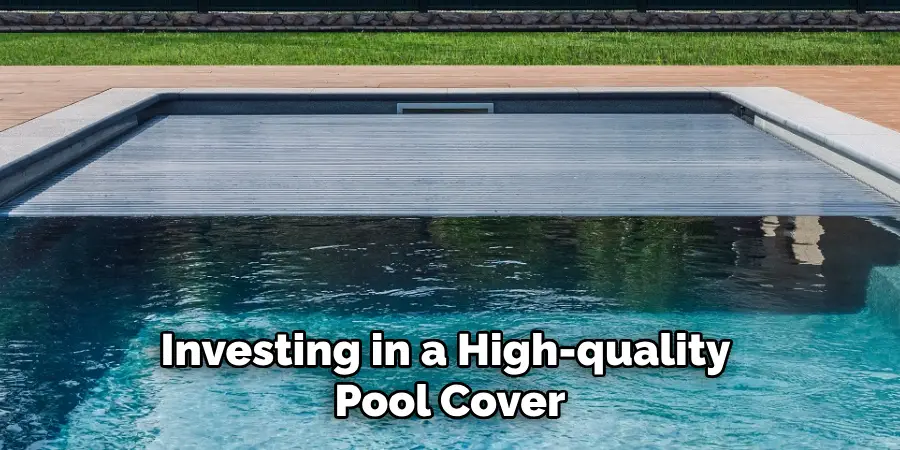
With these additional tips and tricks, you can effectively reduce water evaporation in your pool.
5 Things You Should Avoid
- Avoid Excessive Heating: Overheating your pool not only leads to higher evaporation rates, but it can also be harmful to the pool’s liner and overall structure. It’s essential to maintain a moderate water temperature to minimize evaporation.
- Don’t Skimp on Filtration: A properly functioning filtration system is crucial in maintaining a clean and healthy pool. When the filter is dirty or clogged, it can increase the rate of evaporation as well as cause other issues, such as algae growth.
- Don’t Leave Pool Accessories Exposed: Leaving pool accessories such as floats, toys, and cleaning equipment exposed can lead to unnecessary evaporation. The surface area of these items adds to the overall surface area of your pool and can increase water loss.
- Avoid Overuse of Water Features: While water features such as waterfalls and fountains can add to the aesthetic appeal of your pool, they can increase evaporation rates. Limit their use to only when necessary.
- Skip Chemicals That Increase pH Levels: Certain chemicals, such as alkaline-based chlorine, can raise the pH levels in your pool. High pH levels increase evaporation rates and can also lead to other pool maintenance issues.
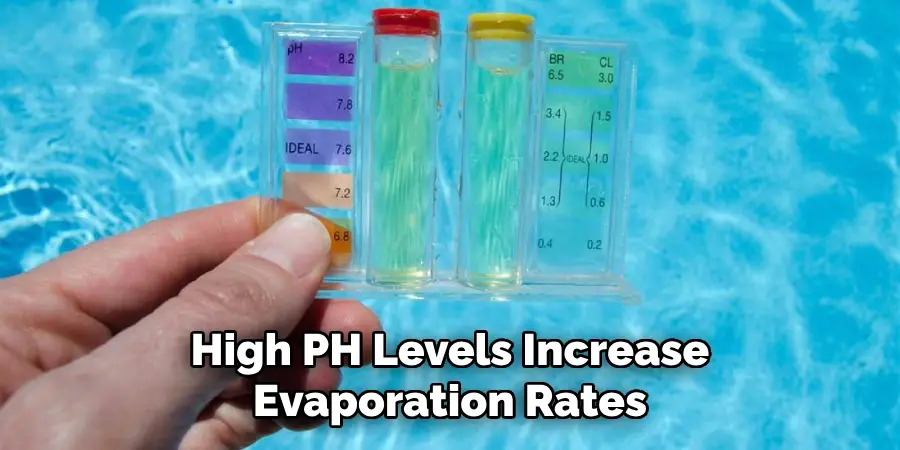
By avoiding these common mistakes, you can significantly reduce the amount of water evaporating from your pool.
Conclusion
How to keep water from evaporating in pool is necessary for sustainability and business longevity. Re-vamping your business pool can bring monumental benefits, like increased customer appeal, longer maintenance timeframes, and cost savings. When you are looking for ways to keep your pool water from evaporating, have confidence in knowing that there are a variety of potential solutions available.
From insulated covers to changing the pH levels or using chemicals such as causative – there is an affordable option for any budget. With the right strategy applied regularly, equilibrium can be achieved, which leads to better air quality and swimability while reducing evaporation loss.
Take action today and contact an experienced pool maintenance professional who will help you assess your facility’s requirements and implement strategies that will benefit everyone!
About
Outdoor Fixes is a distinguished figure in the world of Diy design, with a decade of expertise creating innovative and sustainable Diy solutions.
His professional focus lies in merging traditional craftsmanship with modern manufacturing techniques,
fostering designs that are both practical and environmentally conscious. As the author of diy,
outdoorfixes delves into the art and science of outdoorfixes-making, inspiring artisans and industry professionals alike.
Education RMIT University
(Melbourne, Australia) Associate Degree in Design (Outdoor Fixes) Focus on sustainable design, industry-driven projects,
and practical craftsmanship. Gained hands-on experience with traditional and digital manufacturing tools, such as CAD and CNC software.
Nottingham Trent University
(United Kingdom) Bachelor’s in outdoorfixes.com and Product Design (Honors) Specialized in product design with a focus on blending creativity with production
techniques. Participated in industry projects, working with companies like John Lewis and Vitsoe to gain real-world insights.
Publications and Impact
In diy, Outdoor Fixes his insights on indoor design processes, materials, and strategies for efficient production.
His writing bridges the gap between artisan knowledge and modern industry needs, making it a must-read for both budding designers and seasoned professionals.

